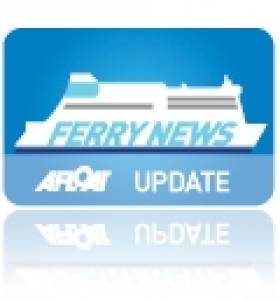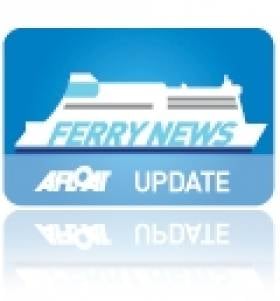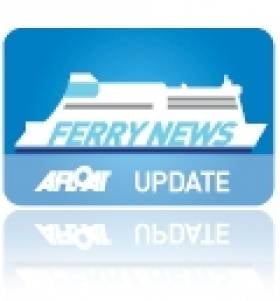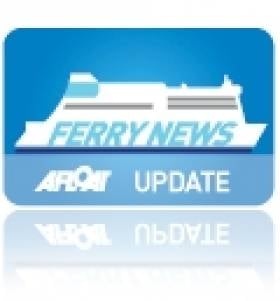Displaying items by tag: P&O Irish Sea
Award Winning Stena Line Look Forward to New Northern Route
"We are moving into a very important time for Stena Line's operation between Northern Ireland and Scotland. On November 21 we are scheduled to start our new Belfast to Cairnryan service which will also see the introduction of two new vessels, Stena Superfast VII and Superfast VIII, the largest ships every to have sailed between Northern Ireland and Scotland," he continued.
Stena Line's switch of Scottish terminal from Stranrear to the new purpose built facility in Cairnryan which is some 8-miles closer to the open sea along Loch Ryan will reduce sailing times by 35 minutes down to 2 hours 15 minutes.
The 30,285grt Stena Superfast VII and Superfast VIII sisters can carry 1,200 passengers, 660 cars and 110 freight-unit / trucks. In addition they have a novel Nordic Spa facility incorporating a sauna and Jacuzzi.
The 206m pair will compete with rivals P&O (Irish Sea) which operates also from a neighbouring terminal in Cairnryan where another pair of sisters European Highlander and European Causeway provide 2-hour sailings to Larne.
Currently Belfast-Stranraer sailings are served by conventional tonnage ferries Stena Caledonia and Stena Navigator which lost engine-power on 14 October, to read more click HERE.
In addition fast-sailings are run by the expensive to operate HSS Stena Voyager which manages a faster crossing time on the existing route by shaving 15 minutes off the link between Loch Ryan and Belfast Lough. In 2008 the terminal in Belfast was relocated downriver to Victoria Terminal 4 (VT4) on the eastern edge of the port from the older inner-city terminal at Albert Quay.
Stena are to lease the 'Superfast' pair for three years from Scandinavia operator Tallink and they are to directly replace both the HSS and conventional ferries.
Strong Winds Cancel Central Corridor Fast-Ferry Sailings
Stena Line's Dublin-Holyhead sailings are on schedule in addition to services on the Rosslare-Fishguard, Belfast-Stranraer (incl. HSS sailings) and Belfast-Liverpool. P&O's Dublin-Liverpool and North Channel Larne-Cairnryan route are also on schedule.
On the Celtic Sea, Fastnet Line's Cork-Swansea is unaffected as there are no sailings on Monday's, Tuesday's and Wednesday's during this month and November. The next sailing is this Thursday from Cork at 20.30hrs and returning Swansea on Friday at 21.30hrs.
According to Met Eireann, this afternoon will be extremely windy, especially across the southern half of the country, with southwest gusts of between 90 and 120km/h. For more detailed and updated weather forecasts visit www.met.ie
P&O Close Seasonally Operated Fast-Ferry Services
As for the remaining winter-serving fast-ferries they are Stena Line's HSS Stena Voyager (1996/ 19,638grt) between Belfast-Stranraer, in tandem with conventional ferries. Next month this route will close as the Scottish terminal relocates to a new ferryport nearby at (Loch Ryan Port) Cairnryan.
In addition two sister-ferries, which are undergoing modifications and an upgrade for their two-year charter on the North Channel, will directly replace the two-hour passage times it takes for the HSS fast-ferry and the ferries Stena Caledonia and Stena Navigator which take 2hrs 50 minutes.
With the introduction of the new tonnage to the Belfast-Cairnryan route, sailings times will be reduced to 2hrs 15mins. Ironically the new ferries which albeit will be the largest to serve on any North Channel route will actually be some 15 minutes slower on the newer-shorter distance route compared to the HSS fast-ferry operated Belfast-Stranraer sailings.
The second fast-ferry service is operated on Irish Ferries Dublin-Holyhead route using Jonathan Swift (1999/5,989grt) which is marketed as the Dublin 'Swift'. She runs year-round in addition to the cruiseferry Ulysses.
Also operating fast-ferry craft is the Isle of Man Steam Packet Company's Manannan (1998/5,029grt) but this is on the none cross-channel route between Douglas and Liverpool.
Irish Sea 'Racehorse' Returns
Dawn Merchant and Brave Merchant represented the first pair of the 'Racehorse' class quartet of ro-pax sisters commissioned for the Cenargo Group. The quartet were built by Spainish shipbuilders Astilleros Espanoles SA in Seville, noting the first pair at 22,046grt where slightly smaller in tonnage terms compared to their 22,215grt counterparts Midnight Merchant and Northern Merchant. Upon delivery in 2000 the second pair were chartered to Norfolkline's Dover-Dunkerque route.
With a 130 truck capacity the Norman Trader can handle a marginally higher number of freight vehicles compared to the Norcape which handled 127 trucks. The Norcape, a 32-year-old freight-only vessel,was stood down in February and remains laid-up at Liverpool's Huskisson Dock. Incidentally, Norman Trader has joined one of her Racehorse class sisters, European Endeavour (formerly Midnight Merchant) which had directly replaced the Norcape on the central corridor route.
Likewise the European Endeavour is no stranger to the Irish route as for the last two years she has acted as winter relief vessel to cover the refits of the routes Dutch built ro-pax sisters Norbay and Norbank. The latter vessel is now undergoing a refit by Cammell Laird Shiprepairers in Birkenhead, now that the Norman Trader is in service to maintain the three-ship operated 8-hour route.
The Norman Trader had arrived into Dublin Bay last Friday from London's Tilbury Docks, on the next day she entered Dublin Port. In recent years she has operated on English Channel routes for the French shipping giant Louis-Dreyfus Armateurs through their ferry division LD Lines.
Norman Trader's (Dawn Merchant) sister Brave Merchant now renamed Norman Bridge also runs for LD Lines 'Motorways of the Seas' (MOS) route across the Bay of Biscay between Nantes /St. Nazaire to Gijón in northern Spain. The 14-hour route which started last year, which was run iniatially as a joint venture between Grimaldi Lines and Louis-Dreyfus and traded as GLD Atlantique.
- Dublin Port
- Bay of Biscay
- irish sea
- Ports and Shipping News
- Birkenhead
- Norcape
- RoPax
- DublinLiverpool
- Norfolkline
- FreightFerry
- Motorways of the Sea
- Norbank
- Norbay
- MOS
- European Endeavour
- Central Corridor
- P&O Irish Sea
- Norman Trader
- LD Lines
- Merchant Ferries
- Cenargo Group
- RaceHorse Class
- Tilbury Docks
- Cammell Laird
- Aintree
- Grand National
- Aintree Grand National



























































